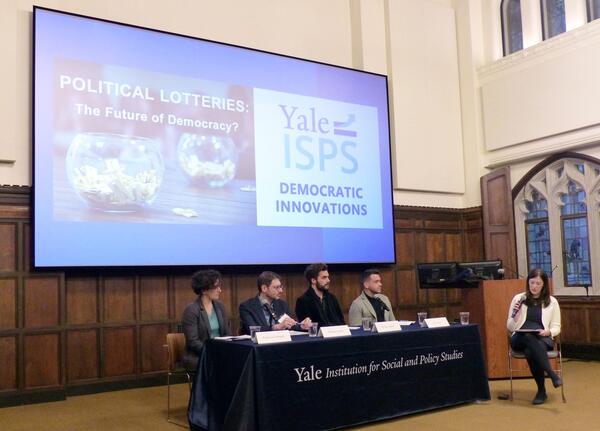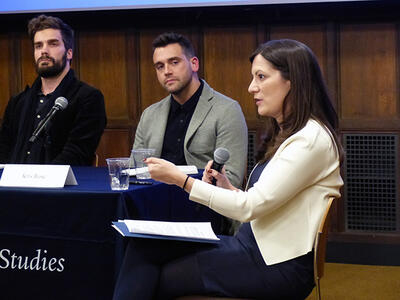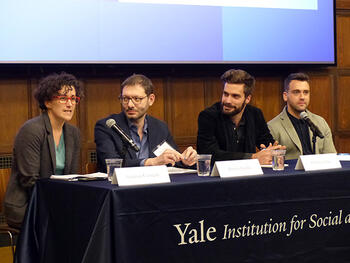Can Political Lotteries Save Democracy? Yale Conference Dives Into Innovations

Around the world and in the United States, political scientists worry that democracy is failing.
Experts track a rise in extremism and radicalism in politics, an accelerating break with long-held democratic norms, a decline in political party membership and influence, an overshadowing influence of elites through campaign contributions and corruption, and a decline in public trust in weakening democratic institutions.
“Voters feel neither included nor represented in a system that is dominated by disconnected party elites,” said Alexandra Cirone, an assistant professor of government at Cornell University visiting Yale as a fellow with the Institution for Social and Policy Studies’ Democratic Innovations program. “Are lotteries the solution?”
Cirone and ISPS explored that question through a conference at Yale Dec. 1, gathering leaders from academia and the private sector to learn from one another about the practicality and effectiveness of political lotteries to bolster public confidence in democracy and enhance policymaking. ISPS’s Democratic Innovations program identifies and tests new ideas for improving the quality of democratic representation and governance.
“We are so pleased to host this highly engaged and forward-thinking group of people dedicated to a better understanding of this ancient and once again growing trend in self-governance,” said Alan Gerber, Sterling Professor of Political Science and director of ISPS. “We created Democratic Innovations precisely to facilitate this type of work and cultivate interdisciplinary collaborations focused on ways we can adapt government and elections to meet our current and future demands.”
Cirone presented her research, conducted with Brenda Van Coppenolle of Sciences Po, assessing cases through European history in which lotteries were used in permanent governing assemblies to improve representation and prevent elite capture. In an upcoming book, the authors will show how lotteries have historically worked best in new democracies without strong parties in place to control elections. Once political parties have gained strength, party leadership removes the provisions for lottery-based participation, consolidating their power to build seniority among their members and reward loyalty.
Over the last decade, governments — mostly in Europe — have increasingly begun to use lotteries to establish short-term, single-topic-based citizens’ assemblies. Some local governments, such as Paris, have established permanent bodies chosen at random to set local agendas.
Christian Grose, professor of political science and public policy at the University of Southern California and academic director of the USC Schwarzenegger Institute for State and Global Policy, presented his research on how California, Colorado, and Michigan use citizen commissions to draw legislative districts. He anticipates participation in citizen redistricting commissions will yield future policy actions and increased civic engagement by participants.
“The reason I think it’s important to study lotteries and decision making is because it’s happening here right now,” Grose said, noting that 20% of all congressional district lines in 2020 were drawn by an independent public commission selected through at least a partial random component. “We need to understand how they are working.”
Grose said legislators and staffers from other states ask him what he has learned about the outcomes and best practices.
“This conference offered a unique opportunity to engage with scholars and practitioners about random lotteries in elections and the design of institutions and governance,” Grose said, noting that at other gatherings he is usually the only academic participant surrounded by practitioners or in a group with only academic participants and attendees. “It has made a really big difference in the way I think about what I do.”
In addition to Cirone, van Coppenolle, and Grose, the conference featured presentations by Federica Carugati of King’s College London and Forrest Sparks, founder and director of Democratic Design & Engagement. Cirone also moderated a panel discussion with Carugati; Dimitri Landa, professor of politics at New York University; Philip Lindsay, leader of the Democracy Innovation Hub at Bard College’s Hannah Arendt Center for Politics and Humanities; and Kris Rose, head of governance insights at Facebook’s parent company, Meta.
“I’m grateful to be learning from folks who are so studied, such deep experts on this issue,” said Rose, whose company has been pursuing community-based deliberation, including one focused on soliciting public inputs on its virtual/augmented reality Metaverse and one on generative artificial intelligence “We are trying to apply the principles and designs of these approaches, which have a deep history that is constantly evolving. This has been a great opportunity to learn about what has happened, what is happening now, and what might be a fit for us.”
In response to a question about replacing elections with a system of selecting all government representatives through a random drawing, Landa said he could see the benefits of introducing some forms of lottery-based reforms that could, for example, help limit the influence politicians have over the rules of their own political contests. But he also expressed caution that defenses of citizens’ assemblies as a substitute for robust electoral institutions can be overly simplistic and optimistic about their potential.
“There are many ways, it seems to me, to reform electoral systems from within,” he said. “And without giving up representational democracy.”
Carugati, a senior lecturer in history and political economy, said social science has yet to fully evaluate the scope and type of the current real-world experiments in citizen deliberative democracy. And while she could see the advantages of technology in bringing people together, she expressed concerns about remote collaborations, particularly those mediated by artificial intelligence. She believes the design of online spaces for participation should find ways to incorporate the civic and collaborative norms she said were more likely to develop when people engage with one another in the same physical space.
“I think it is something truly to consider,” she said. “Virtual online engagements miss out on this social texture of norms that bring us together and make democracy work.”
Lindsay discussed the benefits of collaborating on deliberative forums with academics, teachers, and community leaders on a local level, inspiring younger generations to embrace participating in their government.
“The way I see these are as gyms for democracy,” he said. “If you’re going to design a space that gives people the practical tools for practicing democracy it would look something like this.”
Watch videos of the full presentations and panel discussion.